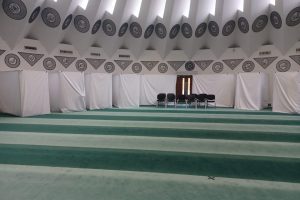
Professor Amtul Razzaq Carmicheal
In a historic address, Hazrat Musleh Mau’ud (ra), the second Head of the world-wide Ahmadiyya Muslim Community said, “Recently, the month of Ramadan, a source of great blessings of God Almighty, came and went. During this month, those who were granted the ability by Allah the Exalted, endeavoured to attain the nearness to God Almighty with supplications, and prayers of the night. They achieved the blessings of the months according to their capabilities and capacity.”[i]
Addressing one of the main objectives of the month of Ramadan, Hazrat Musleh Mau’ud (ra) said, “I think, one of the greatest lessons of the Ramadan is, to which people do not pay much attention, to get motivated to fast throughout the year to attain spiritual perfection.” Hazrat Musleh Mau’ud (ra) said that if we ponder over this, we will see that no type of worship prescribed by Allah the Exalted is restricted to a limited time period, all acts of worship are meant to be practiced at any time of the year. Hazrat Musleh Mau’ud (ra) gave the example of four biggest acts of worship: Salat, fasting, Hajj and Zakat. All these acts of worship are spread over the course of the whole year. Two major Salat are offered at the time of Eid, while the practice of salat can be offered throughout the year. This shows us that it is mandatory for believers to remember God Almighty consistently so that their souls should be refreshed. In the same way, Hajj is prescribed once a year, but a holy pilgrimage can be offered throughout the year known as Umrah. Similarly, Zakat is mandatory once a year, but charitable donations should be made throughout the year. In the same way, the month of Ramadan is a reminder that Muslims should train themselves to fast throughout the year. The month of Ramadan is a dedicated period for believers to undertake the groundwork; so that the enriching impact of this spiritual progress is experienced throughout the year.
Fasting as a religious concept has been practiced for centuries by many faiths in various shapes and forms. A form of intermittent fasting has been practiced by Muslims for centuries. Outside Ramadhan, a voluntary fast may be observed at any time, except on the two festival days.[ii] The Holy Prophet, peace and blessings of Allah be upon him, often observed a fast on Monday and Thursday, but he did not approve of a voluntary fast being observed on a Friday.[iii] Abu Huraira relates that the Holy Prophet, may peace and blessings of Allah be upon him, said: A man’s deeds are reported on Mondays and Thursdays and I prefer that I should be observing the fast when my deeds are reported. (Tirmidhi). Hazrat Ayesha (ra) relates that the Holy Prophet was diligent in observing the fast on Mondays and Thursdays. (Tirmidhi).[iv]The Holy Prophet (sa) also used to observe fast on the day of Arafat and on the tenth day of Muharram.
Some companions of the Holy Prophet (sa) wished to fast every day and the Holy Prophet (sa) advised his companions to fast on alternate days during the four sacred months, at the most. The Promised Messiah (as), Hazrat Mirza Ghulam Ahmad of Qadian, observed a period of six months of fasting and limited his food intake to absolute minimal. He explained that he gained significant spiritual benefit and progress during this period of fasting.[v] Ahmadi Muslims all around the world are encouraged to observe a voluntary fast on Thursdays and Mondays.
In his historic address, Hazrat Musleh Mau’ud (ra) explained a very profound concept. He stated that by encouraging Muslims to offer voluntary prayers in addition to obligatory salat; by adding voluntary charitable donations to the annual compulsory donation of Zakat; and by directing the Muslims to do Umrah in addition to compulsory Hajj, Allah the Exalted has established an important principle. That is to undertake acts of worships at their prescribed times is, in fact, a training exercise. Carrying out these acts of worship at their prescribed times should reinforce to believers that they should practice these acts of worships as frequently as possible. For that reason, the month of Ramadan is a training period for believers so that they can train themselves to fast throughout the year.
The objective of the month of Ramadan is to promote the spiritual well-being of the believers; fasting during Ramadan makes believers proficient in many acts of worship such as voluntary salat, supplication and service to God’s creations. What is the point of becoming proficient in an act of worship and then abandoning it? Hazrat Musleh Mau’ud (ra) elucidated this concept by giving the example of soldiers. He said that soldiers are trained in the skills of warfare and learn to do the parade, engage in reconnaissance and fire on the enemy so that they can defend against the enemy at the time of need. If a soldier thinks that his job is done by completing the period of military training and is not prepared to use his skills throughout the year, this makes his training meaningless. In the same way, the month of Ramadan is the training period for believers so that they cultivate the habit of fasting throughout the year. This will enable believers to attain the benefits of fasting throughout the year.
Hazrat Musleh Mau’ud (ra) explained that one benefit of voluntary fasting is to continually gain Allah’s blessing, and the other is that such acts will promote good practice in the community and inspire others to fast outside the month of Ramadan as well. Hazrat Musleh Mau’ud (ra) advised the Ahmadiyya Muslim Community to try to fast 2, 3, 4 times per month, reiterating that it does not behove a believer to fast during the month of Ramadan and discard this virtuous practice after that. The month of Ramadan is a period of spiritual training for believers with an objective to practice fasting throughout the year. Fasting frequently will enable Muslims to get into the habit of regularly supplicating for the spiritual development and advancement of their families, friends and loved ones. In addition to spiritual benefits, there are numerous health benefits of fasting throughout the year[vi]. Hazrat Musleh Mau’ud (ra) concluded this address by advising the members of the Ahmadiyya Muslim Community to regularly fast outside the month of Ramadan to consolidate the numerous spiritual benefits attained during the month of Ramadan. May Allah the Exalted enables us to do so, Ameen.
[i] https://www.alislam.org/urdu/au/AU21-8.pdf
[ii] https://www.alislam.org/book/ramadhan-blessings/voluntary-fasts/
[iii] https://www.alislam.org/articles/fasting-fourth-pillar-islam/
[iv] https://www.alislam.org/book/ramadhan-blessings/voluntary-fasts/
[v] https://www.alislam.org/library/articles/Life-of-Hazrat-Mirza-Ghulam-Ahmad-Promised-Messiah.pdf
[vi] https://rorenglish.wpengine.com/23282/intermittent-fasting-health-benefits-after-ramadan/




Add Comment